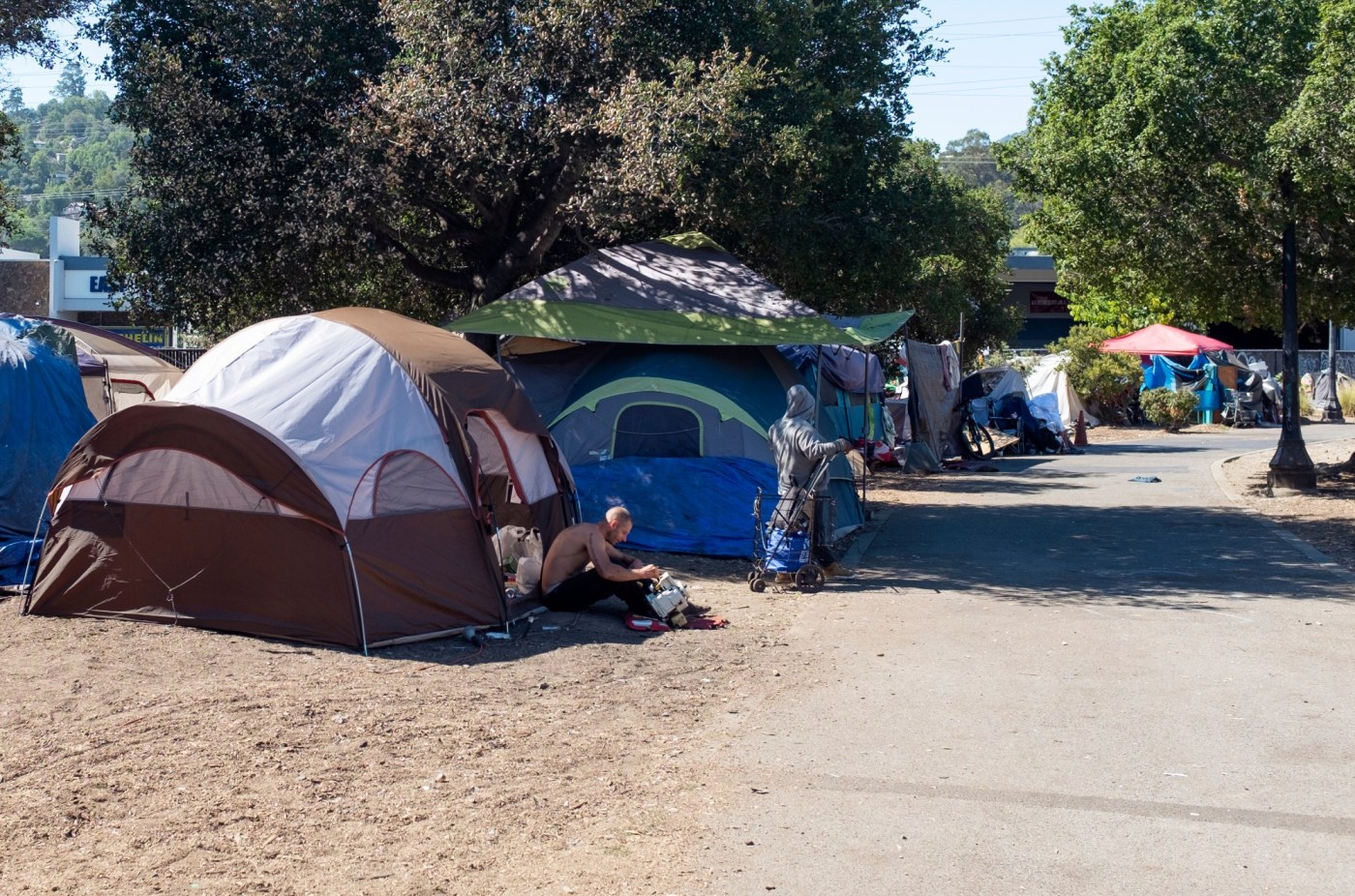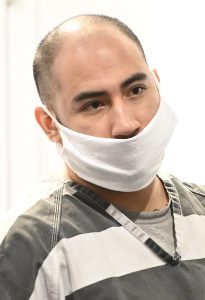A Marin County Superior Court judge has granted a preliminary injunction blocking a San Rafael business from blaring music overnight toward a camp of homeless people.
Judge Andrew Sweet ruled that East Bay Tire Co., an automotive service center at 773 Lincoln Ave., is prohibited from playing music “from any speaker or sound system located outside their store” between 6 p.m. and 6 a.m.
The preliminary injunction Friday came two months after a temporary restraining order imposed the same restriction. The difference is that new order will last the entirety of a related lawsuit.
A case management conference is set for Oct. 28.
Bruce Gaylord, a resident of the homeless congregation at Mahon Creek Path known to the inhabitants as Camp Integrity, lodged his lawsuit in May. Gaylord accused staff of the nearby business of deliberately blaring music through speakers pointed at his tent.
The suit alleges the staff blasted the noise from 6 p.m. May 17 to 6 a.m. the next day, then repeated the act the following two nights.
In his order, Sweet said the defendants did not contest the plaintiff’s accusation “that the sole purpose of this behavior was to make being at Camp Integrity intolerable to its residents.”
“The Court finds that this conduct is unreasonable, the interference is substantial, and Defendants’ alleged behavior creates a nuisance,” Sweet wrote.
“It’s a victory,” Gaylord said.
Gaylord, who uses a wheelchair, said getting around is difficult, and moving camp is harder. He said he suffers from mental health problems and the disturbance was particularly upsetting.
The music stopped the day the suit was filed, Gaylord said.
Robbie Powelson, an advocate for the San Rafael Homeless Union, said he’s glad the nuisance has been abated.
“Camp Integrity residents have a right to sleep peacefully at night without being pestered by scofflaw businesses,” Powelson said.
Related Articles
Opinion: Newsom’s push to enforce anti-camping laws repeats California’s mistakes on homelessness
‘Living in absolute squalor’: Mental health group homes go unregulated in Santa Clara County
Man arrested in homicide at downtown Palo Alto parking structure
San Jose mayor pushes for California to create shelter mandates for cities
SFPD and street cleaners take aggressive approach to clearing homeless encampments
The suit names Jay Ress, general manager of East Bay Tire, as a defendant. Ress could not be reached for comment. Calls to the store were not returned.
The incident is one example of the conflict over how city officials are responding to the homelessness crisis that is affecting municipalities across the state.
Last month, Gov. Gavin Newsom ordered state agencies to swiftly remove camps of homeless people and urged cities to do the same. Newsom’s order came a month after a U.S. Supreme Court ruling empowered officials to enforce bans on sleeping in public spaces.
Local governments are not required to take action, but they are encouraged to adopt policies that are aligned with the order to begin to “humanely remove encampments.”
Officials in Marin County said their efforts so far have focused on a humane approach. San Rafael officials said Newsom’s guidelines are aligned with the city’s approach so far.
Neighbors of the Mahon Creek camp say they are distressed and that more needs to be done to make the community feel secure.
The issue has been complicated further by homeless campers lodging lawsuits against the city to block rules that officials say are designed with safety in mind.
A federal lawsuit preventing the city from enforcing its camping ordinance is ongoing. City attorneys have filed a motion to dismiss the suit, and officials anticipate a ruling in the coming weeks.
Ress submitted a declaration in support of that motion to the federal court on May 7. In the filing, Ress said owners invested nearly $750,000 when the business moved into the location more than two years ago. Soon after renovations were completed, the camp moved next door.
“We have experienced a wide range of issues with inhabitants of the encampment that have threatened our safety and impeded our business,” Ress said.
Ress wrote that occupants of the camp have harassed staff and customers, throwing objects such as glass, metal and knives at their establishments, among other allegations.
“As a primarily retail business, we rely on our appearance and the safety of the facility to bring in new clients and retain quality employees,” Ress wrote, asking the court to empower the city to enforce its laws. “The current situation is unsustainable for our business without intervention from local authorities. If the current trajectory does not change, we will be forced to consider closing our business.”
John Stefanski, assistant city manager, said the city plans to begin implementing its camping regulations once the suit is dismissed.
In June, a group of homeless campers in the area were moved after a fire damaged Marin County Roofing Co. at 250 Francisco Blvd. West. It was determined that structures connected to several campsites were a fire hazard.
Since then, the city has launched code enforcement cases against several people who had illegal structures posing safety risks at their sites.
“To date, the City has successfully abated forty of illegally constructed structures, resulting in the removal of over thirty tons of material from encampments in the last few months,” Stefanski said in an email.
City officials are seeking a court order to remove an additional nine structures after residents failed to comply with a notice to dismantle them by July 31, Stefanski said. An administrative hearing is set for Aug. 20.
Meanwhile, city officials are preparing a comprehensive update on the homelessness response to be presented to the City Council on Aug. 19. At that time, staff expect to discuss a proposed program for a sanctioned camping area, increased case management services and the development of an interim shelter program, efforts funded by a $5.99 million state grant.












